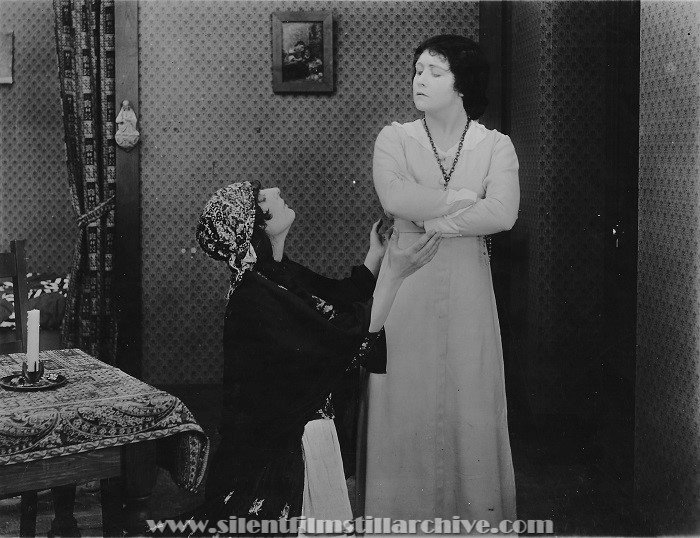![]()

The Sorrows of Love (1916)

TRIANGLE-KAY BEE Story No. 463
Bessie Barriscale. (Ora Carew at
left)
THE SORROW (sic) OF LOVE
"THE SORROWS OF LOVE"
(Kay Bee-Triangle -- Five Reels)
REVIEWED BY OSCAR COOPER
BESSIE Barriscale is once more seen as a nun -- the garb and the character are remarkably suited to her -- in this tragedy, the main incidents of which are in violent contrast to the peace of convent walls. However much one may doubt whether a nun would lay aside the veil to become one with a crowd of Italian revolutionists, inspired by a rather thinly defined impulse to make the world better, there is no denying that her action leads toa stirring series of adventures.
She becomes the patron saintof the oppressed workmen, and tries to keep them from violence. She controls their leader, her lover, until a misunderstanding arises between them. They quarrel and the lover, becoming bitter, returns to his old atheistic beliefs and leads the attack on the palace.
The nun rushes to the palace to warn the Prince, and the workmen are defeated in a bloody battle. The leader is mortally wounded, and he prevents his followers from attaching the nun for her betrayal of them. He forgives her, and dies. The nun goes back to the convent.
All this is told ina dramatic fashion, in which Miss Barriscale's excellent abilities are put to a severe test, from which she emerges with new distinction. William Desmond is a satisfying hero, while other principal supporting roles are carried successfully by Ora Carew, Herschel Mayall and Wedgwood Nowell.
From a story by Elaine Sterne and J. G. Hawks. Director Charles Giblyn worked. At to direction, the picture is not inferior to any Ince subject we have seen. Some admirable sets -- including a remarkable replica of an Italian council chamber -- are used. The atmosphere is gained just about perfectly. The lighting is unusually good, and the mob types are very fine.
-- Motion Picture News, June 10, 1916, p. 3001
MISS BARRISCALE IN TRAGEDY ROLE
From the "Balkans," the setting for the last Bessie Barriscale picture, "Bullets and Brown Eyes," the Triangle stars, has gone to "Venice" for her forthcoming release, "The Sorrows of Love." Advance information indicates that this new Ince feature is a powerful drama with plenty of suspense and stirring action, an absorbing love story and that almost unknown quantity of the films -- a tragic ending. At least, the lovers are separated by the death of one, while the other returns to the convent from which she had gone on an errand of mercy.
-- Moving Picture World, June 3, 1916, p. 1702
THE SORROWS OF LOVE
| Beatrice | Bessie Barriscale |
| Guido Perli | William Desmond |
| Countess Angelica de Vecchio | Ora Carew |
| Prince Candoni | Herschel Mayall |
| Carlo Parodi | Wedgewood Nowell |
Ince (Triangle) feature directed by Chas. Giblyn, story by Elaine Sterne and J. G. Hawkes, starring Bessie Barriscale and William Desmond. Just what the story is intended to convey in the way of a preachment is very vague. An Italian Countess is place in a nunnery by her guardian, Prince Candoni, for deigning to fall in love with a low-born portrait painter. The Prince is the people's oppressor. In the nunnery she confides in Sister Beatrice (Miss Barriscale), who is known as "The Lily," and who has lived all her life within the convent walls. The young Countess dies and gives the "Lily" a ring to be delivered to the portrait painter, who had been sent to jail for conspiring against the government. The Countess has said to "The Lily" that she (The Lily) knows nothing of the world and hence is in no position to pass judgement upon the Countess's love affair. "The Lily" decides to don the Countess's clothes and steal away from the convent to help in the outside world. She is at the jail gates as the artist is released, picks him out from among a mob and hands him the ring. Carl, the artist, swears vengeance upon the Prince and "The Lily" becomes part of the conspiracy, constantly preaching against force, saying "There is a God of Justice and of Mercy. Without him you wil neve win your cause." And again "There is more strength in love than in violence." She marries Guide, the leader of the people. She sees him take another woman in his arms who he is simply sonsoling, and mistaking it for a love affair becomes jealous, seizes a dagger, places it in her breast, steals up behind her husband and draws it to stab him in the back. In drawing the weapon it becomes entangles with her beads and her religious training asserting itself, she withdraws without committing the crime. She leaves a note for her husband and goes away, and he, deprived of her influence, calls the populace to rise and they start for the Prince's Palace. Hearing of it she rushes to the Palace and warns the Prince, who telephones for the Carabineiro. In the melee, Carlo is fatally wounded, but before dying stabs the prince, and Guido is carried home also wounded. She follows her husband home and declares to the conspirators that she was the traitor who gave the alarm. Guido protest her from harm and dies in her arms. She says: "He has won Heaven while I, a life time of penitence will not absolve my sins." The moral of which would seem to be, "Mind your own business." Magnificently photographed and directed, an excellent simulation of Benice with its canals, gondolas and other atmospheric details. But a gloomy, sanguinary story. Jolo.
-- Variety, June 2, 1916, p. 17
with Bessie Barriscale and Ora Carew. Directed by Charles Giblyn. New York Motion Picture/Triangle.
More Information on this film...

This work (The Sorrows of Love (1916),
by
Triangle), identified by
Bruce Calvert, is free of known copyright restrictions.
Books
Dreams for Sale: The Rise and Fall of the Triangle Film Corporation, by Kalton C. Lahue, p. 82
Last Modified January 13, 2022.



















